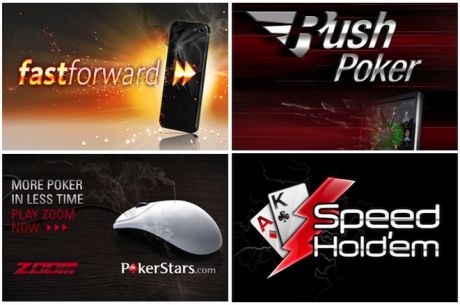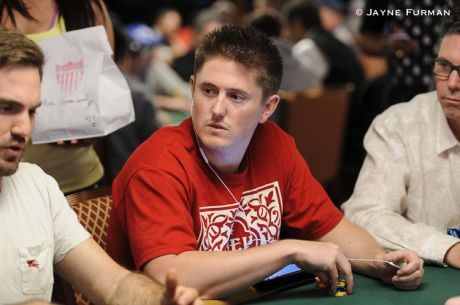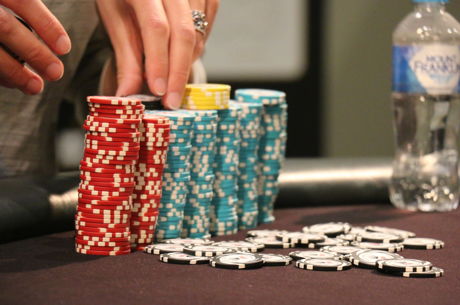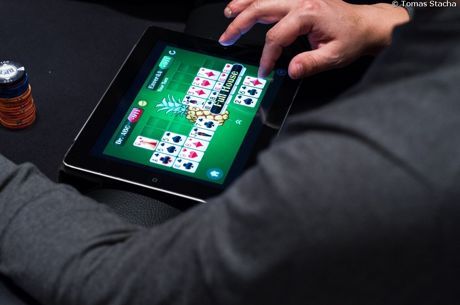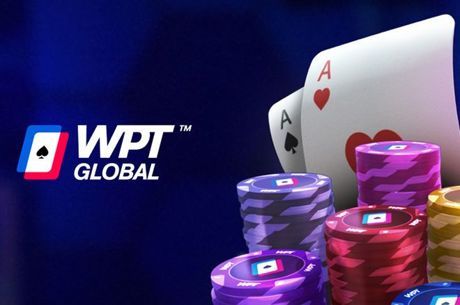Winning Strategies for PokerStars' "Beat the Clock" Games

This week PokerStars introduced a new, fast-paced game called Beat the Clock, kind of a hybrid of cash games and tournaments that like Spin-n-Gos and Zoom Poker presents a unique format only possible online.
Having experimented some with the format, I thought I'd share a few initial impressions regarding these "Beat the Clock" games with an eye toward suggesting how best to approach them strategically.
Beat the Clock: Not Simply a Timed Cash Game
"Beat the Clock" games each last five minutes with one-minute levels, at the end of which the surviving players' winnings are directly proportionate to the amount of chips they have when time runs out. In other words, the payouts resemble what happens at the end of a cash game, with chips being directly converted to cash, unlike in tournaments.
Make no mistake, though �� these new "Beat the Clock" games are not simply timed cash games. The rapidly-increasing blinds and antes and relatively shallow stacks definitely make game play more like a tournament or sit-n-go than a cash game. In a way, the games manage to pack all three "stages" of a multi-table tournament into a short five-minute span �� early, middle, and late.

The first minute �� which generally means just a few hands �� does permit some postflop poker as in the deep-stacked early levels of MTTs, although many players won't try to get too fancy given the starting stacks are only 12.5 big blinds.
The next three minutes do play a little like the "middle stage" of a tournament, albeit one in which there is a preponderance of short-stacked players looking for spots to double up and improve their chances of cashing.
Then the final minute might be thought of as "late stage" tournament poker, though not a final table. Here you'll find many big and medium stacks playing as though they are jockeying for position at a final table (which in this case never arrives), while short stacks try desperately either to hang on or get that one last double to give themselves more than just a couple of blinds.
That said, this is really more of an impression than genuine strategic advice. Your understanding of the different stages of MTTs and the appropriate strategy for each will help you when playing "Beat the Clock" games on PokerStars, but truthfully you'll be better off focusing on...
- short-stacked strategy
- short-handed strategy
- "Zoom" (or "fast-fold") strategy
- chip accumulation (and not merely surviving)
Beat the Clock: Short-Stacked Strategy
Players of turbo and hyper-turbo SNGs as well as PokerStars' Spin-n-Go games should find the Beat the Clock format familiar. Players start with 5,000 chips, with the blinds and antes increasing as follows:
| Level | Blinds | Ante |
|---|---|---|
| 1 | 200/400 | 80 |
| 2 | 250/500 | 100 |
| 3 | 300/600 | 120 |
| 4 | 400/800 | 160 |
| 5 | 500/1,000 | 200 |
As noted above, you might see some small preflop raises and postflop poker during the first level. Sometimes during the fifth level a couple of big stacks with 20-plus big blinds may also "play poker" rather than go for a preflop all-in against each other. For the most part, though, you're going to want to adopt a "push-or-fold" approach, which means understanding starting hand values.
That means often being ready to open-shove with all pocket pairs, all AxXx hands, all hands containing two Broadway cards (ace through ten), Kx7x-suited or better, Qx8x-suited or better, and even 10x9x-suited and 9x8x-suited if on the short side.
You can call all in with most of these hands, too, although obviously it's always preferable to be the one pushing all in and thus having fold equity rather than calling off your stack.
Speaking of getting folds with your preflop pushes, picking up the blinds and antes in a later level is significant in these "Beat the Clock" tournaments. In Level 5 (for instance), if you push from the cutoff or button and get folds, you win 2,300 chips or nearly half a starting stack �� that translates to just over 40% of your buy-in when it comes time to cash out!
Beat the Clock: Short-Handed Strategy
"Beat the Clock" games are played four-handed, which means half the time you're in the blinds (small or big) and the other half you're not (in the cutoff or on the button).
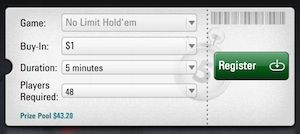
The shallow stacks and hyper-turbo format should have already encouraged you to loosen up your starting hand requirements, so the fact that you're playing short-handed only makes it even more likely your pocket pair or AxXx hand is going to be the best among the four preflop.
Typically you should defend your blinds more often in short-handed tournaments, both because people are trying to steal more liberally and since you're in the blinds a lot more often you'll get hurt a lot if you don't defend.
That applies here, too, although letting go of poor starting hands from the small blind with a "fast fold" is frequently going to be better than mixing it up. Don't always automatically give up your big blind, though, if you've got something worth calling or three-betting with, since smart players in the cutoff or on the button are looking to steal.
Beat the Clock: "Zoom" or "Fast-Fold" Strategy
The games are currently being offered at $1, $3, and $5 buy-ins (which means prize pools of $43.20, $129.60, and $216, respectively). You can also try out a play money "Beat the Clock" game for 10,000 play chips. They run like sit-n-gos, meaning once 48 players sign up the game goes off (you don't have to wait very long).
The tournament is then played according to the "Zoom" or "fast-fold" format, meaning that after each hand players are reseated, and the "fast fold" option is always available to you if you aren't in the big blind and no one has raised yet.
Those familiar with "fast-fold" cash game strategy know of certain tendencies, including the way many players go ahead and choose that "fast fold" option whenever they are dealt poor starting hands, which tends to make blind steals more profitable.
While you'll often encounter a lot of tight play in "fast-fold" cash games as players fold hand after hand waiting for something good, that isn't happening so much in these "Beat the Clock" games where the blind/ante increases make it impossible for players to be too choosy.
Be aware, though, that players do opt out of hands quickly, which means even min-raising from the cutoff or button will frequently earn you pots without resistance. I also think it is advantageous to "fast fold" yourself, especially during the first few levels as you want to play as many hands as you can as you try to accumulate chips.
The "Zoom" format also means it probably isn't worth spending too much time profiling opponents, although it can get interesting toward the end when you start seeing the same players popping up as the last few tables are being redrawn and reshuffled. I've yet to play a game where a "read" I gained on a player in an earlier hand became relevant in a later one, but don't let that stop you from paying attention to opponents' styles if it helps.
Beat the Clock: Focus On Chip Accumulation, Not Survival
In the recent "10 Multi-Table Tournament Tips" series here on PokerNews there was an article devoted to "Chip Accumulation vs. Survival" that discussed how players should concentrate on both in MTTs.
In "Beat the Clock" tournaments, you can mostly forget about merely trying to survive �� it's all about chip accumulation. It doesn't matter if you are the chip leader or 19th of 19 left, your focus should be on getting more chips.
Most of the time around a third of the field of 48 players is still standing after five minutes �� usually somewhere between 16-20 players, give or take a few.
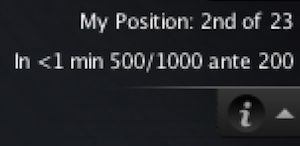
In a regular tournament, min-cashers get back more than their buy-ins (e.g., 1.5x or 2x the entry fee). In "Beat the Clock" games, those barely "making the money" tend to lose money, getting back less than the $1, $3, or $5 they put in. I've seen it happen often that the last two, three, or four cashers end with less than the starting stack, and thus get back less than what they paid to play.
That should tell you that just trying to squeak into the money is a losing strategy in these games. If you are at or below the starting stack during the fifth minute/level, you should not be thinking about "folding into the money." I've even seen players "cashing" $1 games for less than a dime!
Meanwhile if you're a big stack, you also shouldn't be too satisfied at the end to preserve a "chip lead" or your place in the top five. Sure, it looks nice to see your username up high on the list, but in a game where the payouts are solely tied to your chip stack and not made according to a preset schedule (as in MTTs), it's silly to fold through the last level in order not to fall a few positions on the leaderboard.
If you are among the big stacks late, ramp up your aggression and challenge medium-to-short stacks constantly. Think of yourself as being one of those bubble maniacs taking advantage of the general tightness as you gleefully accumulate blinds and antes.
The client shows your position in the upper-right hand corner, but I wouldn't suggest being too focused on the fact that you're "2nd of 23" (or whatever). Rather when a new table comes up, immediately look around the table at the other three players' stacks and decide who to target (those shorter than you) and who to be cautious with (those with bigger stacks).
I'm seeing first-place finishers in these games typically ending with 5-7x their starting stacks, which minus the rake means winning 5-7x their buy-ins.
Final Thoughts
There's certainly a novelty element here, and while the 10% rake andor the necessarily high variance of "Beat the Clock" games may be enough to dissuade some, I've found the entertainment value of these games to be surprisingly high. In fact, although my sample size is still small, so far I'd say I've enjoyed these games more than Spin-n-Gos and regular Zoom cash games.
In any case, the games do reward skill. Players who focus on adopting winning strategies in these "Beat the Clock" games are going to have an edge over those who fail to appreciate how the structure and differing payouts affect your bottom line.

